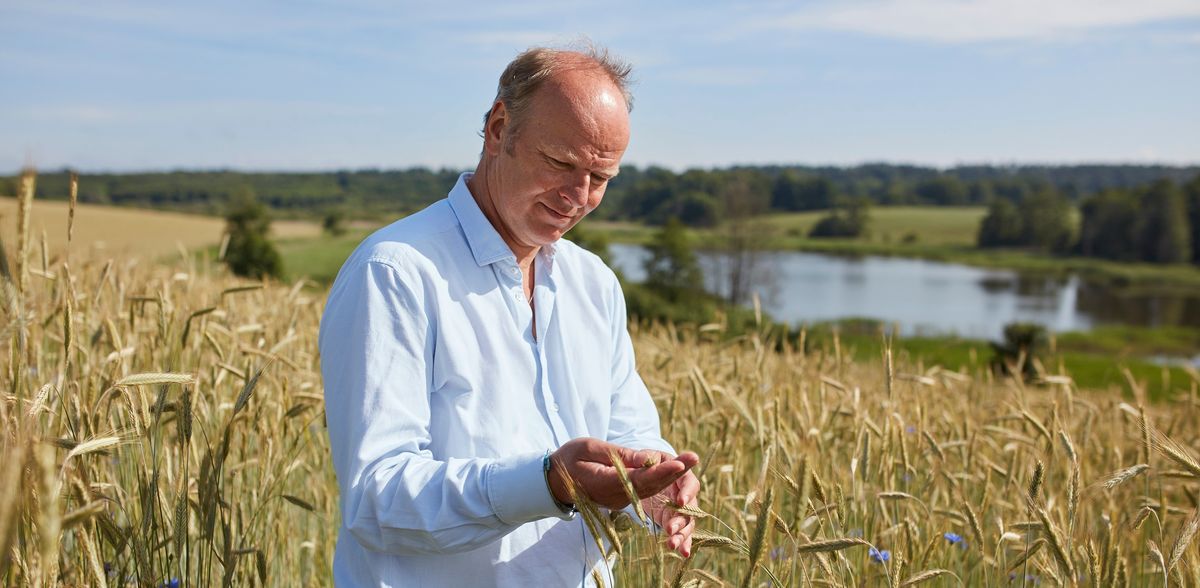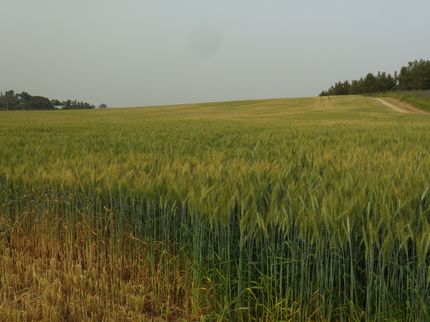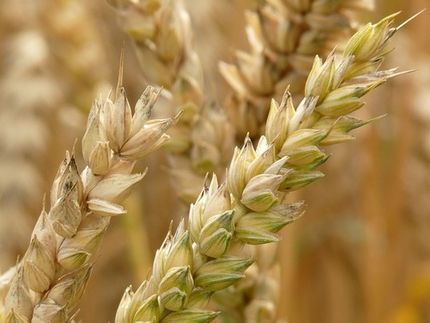125 years of caring for families
Pioneering organic brand HiPP celebrates its anniversary
The birth of the first commercially marketed baby food from HiPP dates back to 1899. The rusk flour ground by Joseph Hipp, mixed with milk, water or broth, not only helped his infant to gain strength, but also marked the starting point for one of the most impressive corporate, brand and sustainability success stories "made in Germany". With this innovation, HiPP brought momentum to the still young baby food market and from then on shaped it with a pioneering spirit and an uncompromising commitment to top quality and organic farming. Together with unconditional care for babies and children, these are the basic ingredients for today's worldwide success of the brand trusted by parents and families - and also form a binding set of values within the company.
Born out of necessity: a baby porridge makes history
In 1899, exactly 125 years ago, a young man became a father for the second time in Pfaffenhofen, Bavaria. Joseph Hipp, who as a child had experienced the death of three of his four siblings in infancy, was concerned at the time about whether and how he could ensure the healthy growth of his own children. When his twins were born, his fears seemed to come true: one of the children was weak and was not sufficiently nourished by breast milk alone. But necessity was the mother of invention and so the founding father of the now iconic HiPP brand ground up a home-baked rusk and mixed it with water, milk or low-fat broth to make a porridge. The filling supplementary food ensured that his baby quickly became stronger and later grew into a healthy toddler. A total of eight of his own children thrived. With the idea of offering support to other families in similar situations, Joseph Hipp wrote down the recipe and began selling his rusk flour in his own store. This was the birth of the first HiPP product "J. Hipp's Kinderzwiebackmehl". In 1932, the foundation stone for one of Germany's most successful family businesses was laid on paper with the founding of "Nährmittel Hipp".
125 years of HiPP: A brand wins the trust of mothers and families worldwide
Today, HiPP is not only one of the leading manufacturers of organic complementary foods, but also offers a wide range of products in the categories of infant formula, pregnancy and baby care and diapers. This makes HiPP the largest baby product range in the German retail sector. The family-owned company employs over 3,000 people worldwide. The plant at the headquarters in Pfaffenhofen, Bavaria, alone produces around one million baby food jars every day. Together with five other production sites in Germany and abroad, HiPP currently sells its products in 60 countries. Since 2016, the company has also operated one of the world's most modern infant formula factories in Herford. HiPP has invested more than 120 million euros in the expansion and modernization of the site and thus in the future viability of the company in Germany as a business location.
To this day, HiPP is not only family-owned, but also family-run. "As an entrepreneurial family, we consciously and wholeheartedly bear full responsibility," says Stefan Hipp. "The company's purpose is and remains our compass of values. Everything we do at HiPP, and how we do it, is consistently aligned with our responsibility towards people, nature and the environment. At HiPP, we act out of conviction for the well-being of babies, their mothers and families and for the preservation of a world worth living in and loving."
Out of love for nature: pioneers and trailblazers of the organic age
Over the years, HiPP has not only developed into one of the best-known and most popular brands "made in Germany", but has also become synonymous with successful entrepreneurship and a consistent commitment to sustainability. HiPP is regarded as one of the first sustainability brands in Germany, and not only by experts. The company has been growing raw materials for HiPP products on organically farmed land since 1956. The entrepreneurial decision to focus entirely on organic quality and organic farming was very courageous at the time: in the 1950s, hardly anyone was familiar with the term 'organic' and there was not yet a broad social demand for this label. HiPP played a decisive role in making organic baby food the standard today and at the same time helped to sensitize society to the clear added value of organic farming for nature.
'The production of top quality in harmony with nature' is still the measure of the family's entrepreneurial activity today. Today, HiPP works with over 8,000 organic farmers worldwide who cultivate 80,000 hectares of agricultural land. This makes HiPP one of the largest processors of organically produced raw materials in the world. Compliance with the requirements of HiPP's own strict organic label always has top priority.
"This is what I stand for with my name": a promise that is more relevant than ever
"This is what I stand for with my name" is probably one of the best-known German brand statements. For Stefan Hipp, it is much more than that: it is the greatest possible promise he can make as an entrepreneur and private individual. Like his father Claus Hipp, the entrepreneur and organic farmer not only bears entrepreneurial responsibility, but also vouches for it in public with his name. For good reason, as HiPP's success has always been inextricably linked to the entrepreneurial personalities of the Hipp family.
To live up to this personal guarantee, HiPP continuously invests in quality control, research, development and innovation management. From the field to the jar, for example, one in four employees in Germany is responsible for guaranteeing and ensuring quality.
Stefan Hipp himself runs a large organic farm, which he manages as a model farm in a sustainable and biodiversity-friendly manner. He grows carrots, potatoes and cereals there and keeps Angus cattle and their calves outdoors all year round. Because the organic raw materials produced there also go into HiPP baby food, as a farmer he is subject to the high quality standards that he sets himself as an entrepreneur. Stefan Hipp regularly brings together leading agricultural and food experts on his organic farm to develop new methods for organic farming. The aim is to integrate sustainable farming practices and the protection of biodiversity into everyday farming by means of concrete recommendations for action, and to set new trends in organic farming worldwide.
However, HiPP is constantly innovating not only in the agricultural sector, but also along the entire value chain. For example, the filling of baby food in the now iconic jars can be traced back to HiPP.
The HiPP jar and its unmistakable appearance
In 1959, the small meals were given their practical and iconic glass packaging for the first time. The so-called 'little jar' was born. The HiPP jar not only revolutionized the manufacturer's production and sales, but has since inspired thousands of parents to creative and useful second uses in their baby's everyday life. Within the first year, an infant eats around 728 jars. HiPP processes around 150,000 tons of organic raw materials every year. Surveys have also shown that HiPP jars are not only enjoyed by the little ones: One in five is eaten by adults. The HiPP complementary food range now offers over 115 different varieties, introducing babies and toddlers worldwide to a wide variety of tastes.
Looking to a future worth living
In its anniversary year, the company is focusing above all on expanding various sustainability initiatives. With the 'Packaging Mission 2025', all HiPP packaging should be at least 90% recyclable by 2025. The jars are already ahead of this target with a share of up to 98%. Future efforts will also focus on the popular squeeze pouch, which will be given a recyclable film as part of the packaging mission.
Another important project for HiPP is the insect study, which aims to make an important contribution to protecting biodiversity. This study, which was launched in 2018, is the first of its kind in the world to carry out a quantitative and qualitative comparative analysis between organic and conventional farming. Together with the Bavarian State Collection of Zoology (ZSM), the Bavarian State Natural History Collections (SNSB) and the Paris Lodron University of Salzburg, the study is being conducted for the seventh time. Its results will serve to provide new impetus for agriculture that is as resilient as possible and to develop it further in the interests of biodiversity.
Stefan Hipp's mission: making organic baby food the international gold standard
For HiPP, organic quality is not a marketing trend, but has been a matter of course for generations. It is based on the conviction that organic is the only way to take serious responsibility for the next generation and their living environment - and should therefore not be a privilege. For this reason, the company is committed to ensuring that babies and young children all over the world have access to organic food as standard. "High-quality, natural and healthy food should be available to all babies and toddlers. Our goal is to establish organic quality in baby food as an international benchmark - a gold standard that has been trusted for decades and that preserves and protects the health of the youngest and the future of our planet," emphasizes Stefan Hipp.
Note: This article has been translated using a computer system without human intervention. LUMITOS offers these automatic translations to present a wider range of current news. Since this article has been translated with automatic translation, it is possible that it contains errors in vocabulary, syntax or grammar. The original article in German can be found here.
































































